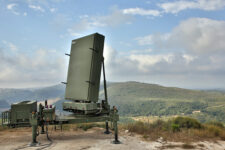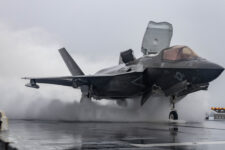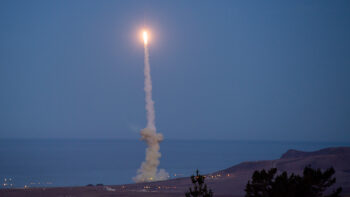
Russia’s President Vladimir Putin and North Korea’s leader Kim Jong Un visit the Vostochny Cosmodrome in Amur region on September 13 2023, ahead of planned talks on a weapons deal. (Photo by MIKHAIL METZEL/POOL/AFP via Getty Images)
SYDNEY — Since September 2023, when North Korea’s leader met with the president of Russia, millions of rounds of ammunition have flowed from Pyongyang to support the Kremlin’s war in Ukraine, with Russia supplying desperately needed cash and food in return.
The White House is “very concerned about this burgeoning partnership, which is moving quite rapidly,” Mira Rapp Hooper, the president’s top advisor on the Korean peninsula, said March 4 at the Joong Ang-CSIS Forum. In return for huge quantities of artillery shells and North Korean ballistic missiles, she said North Korea wants advanced tech. Using the intelligence term of art, she said that “we assess that Pyongyang is seeking direct military assistance from Russia to include fighter aircraft, surface-to-air missiles, armored vehicles and ballistic missile production equipment or materials, as well as other advanced technology.”
Since August last year, North Korea has shipped to Russia about 6,700 containers, which could accommodate more than 3 million rounds of 152mm artillery shells or more than 500,000 rounds of 122mm multiple rocket launchers, according to the South Korean Defense ministry. Presumably all of that is destined to be used by Russia to wage war against Ukraine.
On top of the simple provision of weapons, the two sides appear to have developed a feedback loop in which the Democratic Peoples Republic of Korea gets “valuable technical and military insights” from Russia’s use of its missiles.
In the longer term, these combat qualified weapons may well open new markets to North Korea, providing another revenue stream for the beleaguered regime, Hooper said.
“And let’s not forget that as Russia continues to use DPRK weapons, the DPRK may become an increasingly attractive source for munitions, arms and missiles to other military regimes throughout the world. So the transfer of sensitive military technology is certainly a concern. And there are also other ways that Russia can provide support to the DPRK that continue to allow Pyongyang to develop its WMD [Weapons of Mass Destruction] and ballistic missile programs,” she added.
In response to all this, and to China’s increasingly belligerent activities in the region, the United States has recently drawn much closer to South Korea and Japan’s militaries, hoping to counterbalance and deter all three competitors.
“We’re now sharing more intelligence, we’re aligning our policies better, and we’re coordinating policy action to try to combat the most problematic dimensions of this cooperation. And that effort is really moving fast and furious,” Hooper said.
“Under the same framework, we’re also engaging closely on DPRK related issues at the highest levels, with countries around the globe trying to mount a multilateral efforts to push back against DPRK-Russia cooperation, and that includes in our diplomacy with the PRC. We will continue to discuss these growing challenges and their troubling implications around a wide variety of international institutions, and in multilateral groupings and with friends, especially in both Europe and the Indo-Pacific.”
One of the other tools the US is using is openness, with the National Security Council expert saying that “we have had a strong and sustained effort to declassify information related to DPRK-Russia ties so that I can share with you today, the types of information that I have just shared. We want to shed light on this cooperation so that we all are better positioned to take action and to coordinate the steps that we might take. And that includes on issues like ballistic missile transfers and munitions transfers. And as new evidence comes to light, we will continue to share it.”
Of course, sanctions will also play a role, though it is hard to see how much more damage can be done against two regimes that are already heavily sanctioned and have proven adept at evading the impacts.
As Russia Increases Ties, China’s Sway Falters
Among the intriguing second order effects of the newly close Russian-DPRK relations is that, according to a former special assistant to the president for the Korean Peninsula at the National Security Council, China is losing influence over arguably its two most important neighbors.
“It’s actually reducing the leverage that China has over North Korea and over Russia,” said Allison Hooker, now a senior vice president at American Global Strategies, a Washington company that specializes in providing defense and national security advice. “This has a number of second tier effects … But it ultimately reduces the efficacy of sanctions on North Korea and Russia because China’s leverage is being reduced by this relationship.”
Matthew Pottinger, a fellow at Stanford’s Hoover Institution, told the conference that the best way to reshape regional and global threats posed by Russia, China, North Korea and Iran is deterrence.
“The cooperation between North Korea and the Russian dictator is emblematic of the new axis that is pulling together to try to see through to completion the wars of aggression they are waging or planning around the world,” Pottinger, a former Trump administration deputy national security adviser, said. “Deterrence is the name of the game because we are confronting wars of aggression, aggression by revanchist totalitarian dictatorships in Moscow and Tehran aided and abetted by revanchist totalitarian dictatorships in Beijing and Pyongyang.”
But the world’s democracies, Pottinger said, seem to be failing at the game.
“Let’s be frank. The record of the past few years is marred with failures and signs of trouble. Vladimir Putin, unfazed by Washington’s threats of sanctions plunged Europe into its most destructive conflict since World War Two,” he said. “The Islamic Republic of Iran equips the terrorist group Hamas to initiate a war with Israel. And once that war had started, Iran mobilized several of its other terrorist proxies to rocket Israel attack commercial and military ships in the Red Sea and strike US troops across the region.”
In the Indo-Pacific, China, faced with increasingly integrated regional allied militaries, has not “backed off,” he argued. “Beijing has also intensified its campaign to impose Chinese control over the South China Sea, home to some of the world’s most important international sea lanes and fisheries. It is doing so in contempt of international norms and court rulings, and in defiance of public opinion across Southeast Asia.”






















